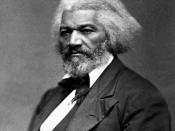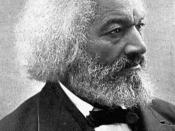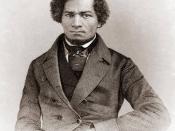Slavery; an Atrocity
In the 18th and 19th centuries, autobiographical accounts of ones life were very commonplace. However, nothing shocked and enthralled a much-divided America more than, Narrative of the Life of Frederick Douglass, an American Slave. From the first page, it engrosses the reader in a world of atrocities. The text, one could go as far as to say, defines slavery in America. The book provides insight into the minds and motives of Southern slave owners, the hardships of everyday slave life, and the attitude of Northerners at the time.
"Slaves know as little of their ages as horses know of theirs (47)." Frederick Douglass accounts in his thrilling and morbid firsthand account of slavery in the south. Douglass lets the reader look at slavery in a style that reflects the desperation of slave life. Points covered range from the exploitation of slave women by their white masters to the violent treatment, and in some cases murder of slaves, to the back-breaking labor and lack of personal time.
The biography includes chilling accounts of his mother. She walked twelve miles every night to see him, in infancy, and when she died, Douglass was not even allowed to witness her burial. This was common practice in those times, but to the modern reader, this is quite appalling. Douglass' life was only made more complicated by the accusation that his master, Captain Anthony, was also his father. The treatment of these 'mixed' children was often worse than that of regular slave children due to the fact that the mistress of the house felt animosity towards them. As a result, Frederick had to face the wrath of Captain Anthony's wife. What made Douglass' experiences truly unique was the fact that he learned how to read and write. Most slaves were killed if...


